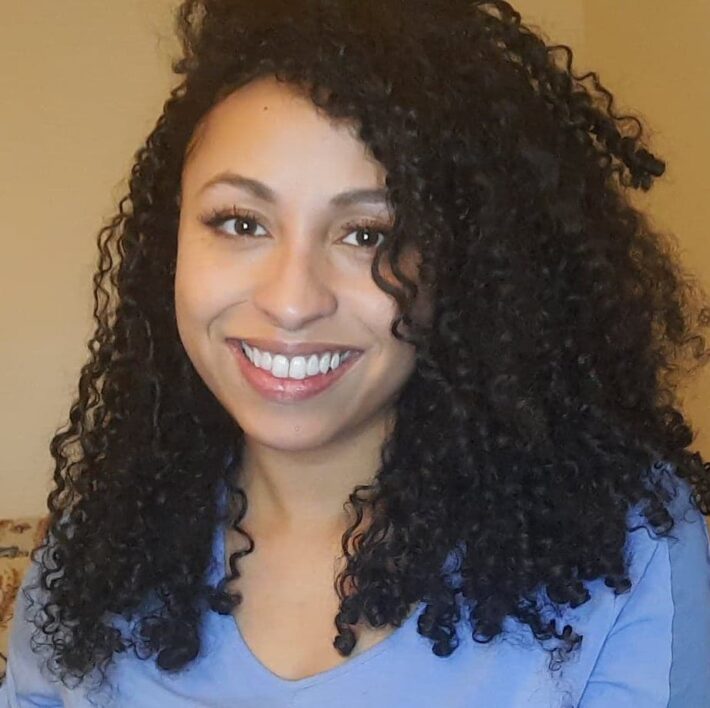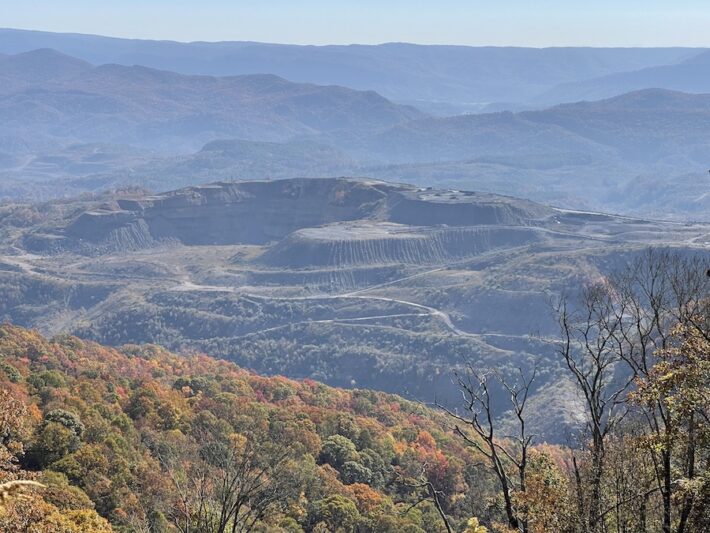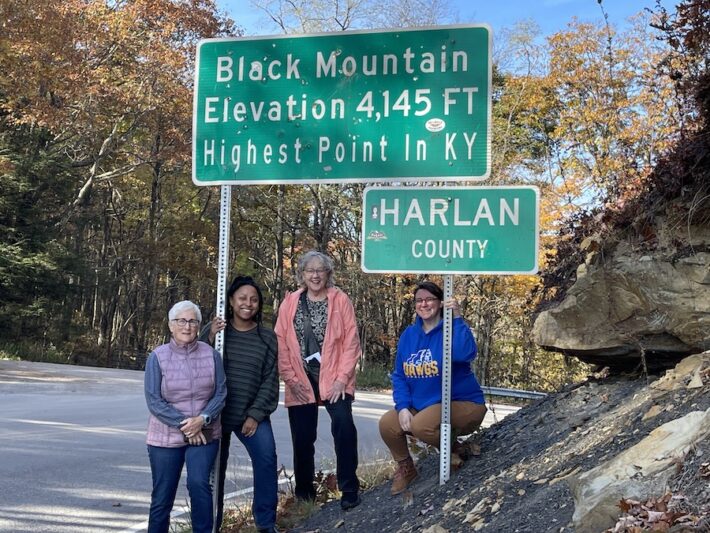Faith and Money Network Trips of Perspective have taken members to countries and communities with vibrant cultures, including Haiti, India, and Bosnia. In recent years, the network has focused on domestic trips, visiting Wise County, Virginia originally in 2011 and since taking groups to experience Southern Appalachia nearly a dozen times.
Ahead of our fall 2023 trip to visit our friends with the Southern Appalachian Mountain Stewards (SAMS), we spoke to Jess Mullins Fullen, lead organizer (and sole SAMS staffer). Jess likes to say she was “born, bred, and cornbread-fed in [the] hills and hollers” of Southern Appalachia. She grew up in coal camp housing in Jenkins, Kentucky, as the descendant of coal miners and homesteaders stretching back over generations.

Jess is a mother of two and a board member for several organizations in the Appalachian region, and she’s at the helm as SAMS enters into a new era of intersectionality and collaboration with the launch of the Mountain Movement Hub, a physical space and organizing concept that will bring more resources to local groups who are working to break down barriers and increase equity in Southern Appalachia.
In this conversation, she shares how the Movement Hub will create more opportunity and lower the barrier to entry for community organizing, and why she believes that SAMS’ mission of addressing the legacy costs of extraction can be transformative in her community and beyond.
As she said in the beginning of our conversation, “You can’t have environmental justice without social justice. It’s all interconnected.”
This interview has been edited for length and clarity.
Brittany Wilmes, Faith and Money Network: How does the leadership structure work at SAMS?
Jess Mullins Fullen, SAMS: Well, we are transitioning that right now. We’re trying to get to something that feels more democratic and more open and inclusive to our membership so that all of the decision making isn’t at the top. We’re working towards a collective governance model, but it’s a process.
Right now, we have a board of seven members, and part of that board is a committee with the president, a treasurer and a secretary. That’s going to shift, because a lot of those responsibilities are shared anyway.
In terms of staff right now, it’s just me. We’re reevaluating staffing beyond just me. We have a lot of help, and it’s important that we value folks’ labor.
Wilmes: When I saw your title (lead organizer), it piqued my interest. It’s not what you would expect for a typical nonprofit of your size, where you might be executive director. How did that come about?
Mullins Fullen: It’s interesting you ask that, because I was recently in a board meeting for another organization. There’s a leadership transition happening there as well, and they said, we need an executive director. And someone was like, well, you actually don’t. You need somebody to be in that position so that they can sign things, but you don’t have to have an executive director by name — that’s reinforcing a sense of hierarchy.
The reason I’m lead organizer [at SAMS] is because we’re all organizers. So I’m just the person that’s doing a lot of coordination and scheduling to make it easier for other organizers to move.
Wilmes: How would you describe SAMS to someone who’s new to the area, or maybe, like you, who grew up there but wasn’t familiar with the organization? At first glance, the organization has an ecological focus, but like you’ve said, there’s so much more going on.
Mullins Fullen: That’s really sticky, because you want to be mindful of meeting people where they’re at. So I think that it’s easiest to start from that ecological, environmental focus. Our mission is addressing legacy costs of extraction.
So what does that mean? What have the costs been overwhelmingly? Where does it start and how does it radiate out? How have people been impacted by the advent of the coal mining industry and its loss? So, we’re looking at poverty impacts. We’re looking at infrastructural issues. We’re looking at, at the same time, how Appalachians have been perceived in the media, that output.

So we’re dealing with truth and reconciliation in a lot of ways. Yeah, it’s a lot. So it’s hard to parse that.
I think that’s why it’s easy to stick with the mission of addressing legacy costs of extraction, what we have and what we have left — and what that all means to people who live here today.
Wilmes: How does that land in the community? I’m thinking about your family with its long coal mining history and identity. How do former coal miners understand your work?
Mullins Fullen: There’s a really powerful shared collective culture and history. Something that I’m really mindful of is that a lot of time in movement work, people like to use terms that can be really inaccessible or alienating to the folks on the ground that we want to help.
So I think, just talk to people like you’re talking to your cousins or your mamaw or your papaw. We have all been through the same stuff. We have all experienced the same things. So we should be able to have conversations about that, even if they can seem polarizing.
This is one example I always give: We were canvassing, when I first started, in a neighborhood where there was a proposal for a new mine, so we were just letting folks know. It was really shady dealings, you know, there was a public comment period and an informal session, but nobody in the community knew about it. So we were telling people, you can come out and let your voice be heard. The first house we stopped at was home to a retired coal miner. He was outside working and his garage was open. We told him who we were, who we were with, what we were doing.
He was like, “I don’t want no tree huggers, I want none of that. You know, I was a union coal miner for many years, and it put my kids through school.”
First off, I get it! It’s challenging because it’s been impressed upon a lot of people that environmental organizations are anti-coal miner. No! I love our coal miners and I’m so proud of our heritage, but we still need to be able to critique what industries have done to the land, but primarily the people here, for profit.
And so I let him say those things. I told him, I care about your experience. I care about how you feel. I think our biggest problem here, and this is something that we all collectively, culturally feel, is that there is a company trying to move in and put in a mine above your home, and you have no idea and you deserve to have your voice heard.
And then we started getting on middle ground. And he was like, well, you know what? What you need to do is not come here to us. You need to talk to the legislators in Richmond and in D.C. for having these bond programs messed up. And then he invited us in for a pop and we got to talk and he ended up showing up to that informal session and he brought peers. A ton of these retired coal miners were firing off questions and I don’t know if this is why the permit fell through, but the permit fell through!
We did not [coach] them or tell them to say this, but they were telling the folks representing the mining company, “The blasting is going to destroy the foundation of my house. This is going to pollute the water behind my home even worse. My grandkids play in that. This is going to pollute the groundwater. I grow a garden.”
They were saying these things.
And I want to rewind really quick, because when I say to somebody around here that a company is coming in and they’re not asking for permission, people can remember in their bones the destruction that happened when coal companies came for the first time. And what that did to families. And how that changed the community. We’ve heard stories that came from our great-grandparents and our great-great-grandparents.
So it’s important to understand the history that we’re all coming from and using that to ground the conversation.
Wilmes: OK, so let’s take a step back and talk about what’s new for SAMS. The organization has been around since 2007, and you’re about to launch the Movement Hub. How’s progress going and what are the hopes for this new center?
It’s going really well. Our hub partners include a youth-focused group, Stay Together Appalachian Youth, a queer affinity art collective, the Patchwork Kinfolx, and we have another ecological organization, The Clinch Coalition.
SAMS is the steward of the grant that created all of this. It’s a physical space (SAMS Community Center), but it’s also an organizing concept that we’ve coined The Mountain Movement Hub.
You can’t have environmental justice without social justice. It’s all interconnected.
Jess Mullins Fullen
We know that in rural communities, it can be really hard to move because of physical infrastructure. You may be 30 miles apart from somebody, but it takes an hour to get there, right? So there’s that component, but also resources. Something as simple as not having access to a printer or not having adequate access to the internet or a meeting space that is accessible for handicapped folks are some of the barriers. They haven’t necessarily stalled the movement work, because these people are moving in these hills and hollers. Do not tell Appalachians “no,” because we’re fixing to do it, even though it can be difficult for people to really jump in the way that they want to.
So that is the hope of the hub. It’s a place for other grassroots organizations to share capacity and build together. And again, back to that intersectional idea, we all may have different specific missions, but we’re value-aligned, so this space will be able to create something really tangible and juicy.
Wilmes: What are some of your biggest challenges as a nonprofit organizing in Appalachia?
Mullins Fullen: That’s a good question. I think in the past, it’s been all of the things that I mentioned. It could be trouble finding a physical space or trouble with securing funding. That’s another thing the hub cares deeply about — helping autonomous groups who might not be formalized yet attain funding to make their work sustainable.
We want to share capacity amongst ourselves, you know, people work, people have day jobs. Most folks aren’t paid by the organization. It’s all volunteer work. So capacity, that’s another thing.
Especially in frontline communities, you know, people are worried about paying the bills and they don’t have much time, but they don’t even feel supported in the work that they’re trying to do. So the hub is a space where support emotionally and structurally abounds.
Wilmes: You’ve mentioned the challenges around funding, and some of that funding obviously has to come from outside of the community, whether from the government or other individuals or organizations. For those who don’t live in Appalachia but want to invest in those communities, how do you break down some of these stereotypes about what’s happening in your region?
Mullins Fullen: I think that a conversation that we also need to have as Appalachians is that being poor is not an internal failing. People are poor financially because of external factors. And for decades, for a generation or more… god, now I’m thinking of the Hatfields and McCoys! So for generations, the idea of Appalachia in the American mythos had been like this backwoodsy, you know, we’re ignorant and even now, all of our issues, we do it to ourselves.
Something that was really significant to me happened after this catastrophic flooding last July in East Kentucky, where I’m from. The floods immediately impacted some localities and municipalities over here in Virginia as well. I would read the comments sections in national media coverage of the flooding, and people would write, “they shouldn’t have voted red.” Well, it’s not that simple. It’s not that simple at all.
People will say, “I didn’t realize I was poor until somebody told me I was poor.” I get that, because culturally, this is one of the richest cultures that has been homegrown and is a beautiful mix of Black people, Scots-Irish settlers, African folk and Native indigenous culture. Now that’s what we have here. So our culture is rich in many things, but what we’re lacking, we have not done to ourselves, and power concedes nothing.
So it’s just about getting to a point where we can have open, earnest conversations with each other, and I don’t know if that’s going to happen in my lifetime. But I do know that we’re working for that.

So that’s what I would tell people outside of the region. Appalachian folks did not choose this. And it’s not as if they’re actively choosing to perpetuate the situation that we’re in now. People focus on the here-and-now because they have to.
We do need help, and we are struggling. But by God, we care deeply and love deeply and want to get there. It’s just figuring out ways to get there together. Because otherwise what would collectivism be, even if we disagree with each other?
Understanding Appalachia is extremely complex, especially when you think about how it’s a majority-white region. Heterogenous, but a majority-white region, and that can sometimes muck up the narrative of what people think this place is and what people think we need.
Wilmes: What is your team most excited about? What gives you hope? What keeps you going?
Mullins Fullen: We’ve pretty much finished the first leg of strategic planning with Capacita [Consulting]. We’re getting ready to work on implementation now. Mike [Little] was actually the person who put us in touch with Adriana and her team, and we are forever thankful. They have been incredible! We love them, so we’re really excited about implementing that strategic plan.
We’re really excited about the new phase in SAMS as we move forward with this different type of governance. It’s emergent, and everyone is still working out the kinks, but we’re going to be doing it alongside the other groups that we partner with. We’re really excited about the hub and what that can mean and how it could enable people in our community to get involved. It doesn’t have to be with any of the inaugural organizations. If they have ideas that they want to put into action, that’s great; we’re just here to love and support. Justice for Appalachia means justice for everyone. We’re honored to get to be part of another step in that direction.
Interview by Brittany Wilmes | May 24, 2023
Brittany is a freelance writer, editor, and marketer based in Portland, Oregon. She has nearly 15 years of experience working with nonprofit organizations, helping them to grow communities that are grounded in integrity and to tell their stories with vision and creativity.